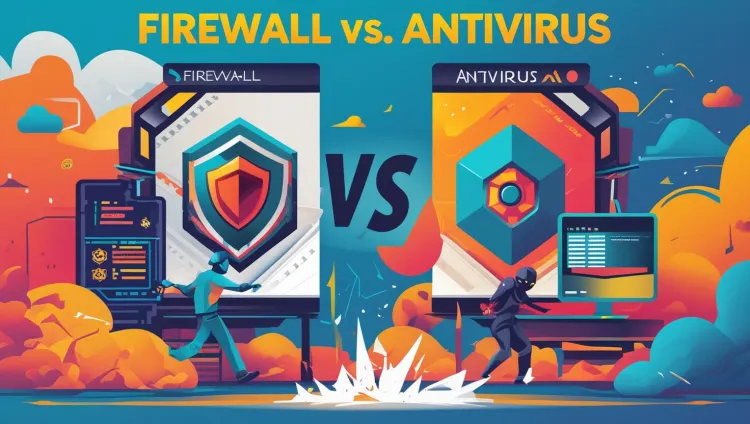What is the difference between a firewall and antivirus software, and why are both necessary for cybersecurity?
Firewalls and antivirus software serve different but complementary roles in cybersecurity. A firewall acts as a barrier between your internal network and external threats, inspecting incoming traffic and enforcing access control rules. Antivirus software, on the other hand, detects, removes, and prevents malware already present on the system. Firewalls monitor network activity, while antivirus tools scan files and applications. For comprehensive protection, both are essential: the firewall prevents unauthorized access, and the antivirus handles internal threats and infections.

Table of Contents
- What Is a Firewall?
- What Is Antivirus Software?
- Key Differences Between Firewall and Antivirus
- How Firewall Works: Network-Level Defense
- How Antivirus Works: Device-Level Protection
- Do You Need Both Firewall and Antivirus?
- Real-World Use Case: Why Both Are Essential
- Summary of Firewall vs Antivirus
- Conclusion
- Frequently Asked Questions (FAQs)
In today’s digital world, protecting your data is more crucial than ever. Two of the most common tools used to defend against cyber threats are firewalls and antivirus software. While they might seem similar, they serve very different purposes in cybersecurity. Understanding the difference between a firewall and antivirus can help you build a more secure system.
In this blog, we’ll break down how each works, their differences, and why you should never rely on just one.

What Is a Firewall?
A firewall is a network security system that acts as a barrier between your internal network and external sources (like the internet). It controls incoming and outgoing traffic using a set of security rules, allowing only authorized communications.
Firewalls can be implemented as hardware, software, or both. They’re commonly used by organizations to prevent unauthorized access, detect suspicious behavior, and block known attack patterns such as IP spoofing and routing attacks.
What Is Antivirus Software?
Antivirus software is designed to detect, remove, and protect against malicious software (malware) such as viruses, worms, Trojans, spyware, and ransomware. It operates at the endpoint level, meaning it protects individual devices like laptops, desktops, and mobile phones.
Unlike firewalls, antivirus software can’t control network traffic. Instead, it monitors system files, runs scans, and removes or quarantines threats already inside the system.
Key Differences Between Firewall and Antivirus
Let’s explore the critical differences between firewalls and antivirus tools:
| Feature | Firewall | Antivirus |
|---|---|---|
| Implementation | Found in both hardware and software | Only implemented in software |
| Function | Monitors and filters incoming/outgoing traffic | Scans for and removes malware |
| Monitoring Method | Based on pre-defined set of rules | Uses techniques imposed by manufacturer |
| Threat Scope | Focuses on external threats | Handles both internal and external threats |
| IP Spoofing & Routing Attacks | Can detect and block | Not designed for such attacks |
| Filtering Capabilities | Filters and inspects incoming packets | Scans compromised apps and systems |
| Packet Monitoring | Inspects inbound packets and flags threats | Scans malicious software after infection |
| Response to Threats | Proactively blocks unwanted access | Reactive — removes threats once detected |
| Typical Use Case | Network-level protection (routers, firewalls) | Endpoint protection (PCs, laptops) |
How Firewall Works: Network-Level Defense
A firewall works on the perimeter of your network, allowing or blocking data packets based on set rules. It inspects headers, ports, and packet contents to detect anomalies and can prevent unauthorized access attempts from hackers.
Advanced firewalls can also detect suspicious behavioral patterns, helping prevent distributed denial-of-service (DDoS) attacks, brute force attempts, and zero-day vulnerabilities.
How Antivirus Works: Device-Level Protection
Antivirus software focuses on identifying and removing harmful files from your devices. It compares files against a database of known threats and uses heuristics to detect new or modified versions of malware.
Some antivirus tools offer real-time protection, automatically scanning downloads, email attachments, or installations. They don’t block access to networks like firewalls but are crucial once a threat breaches the perimeter.
Do You Need Both Firewall and Antivirus?
Yes, absolutely.
-
A firewall alone can’t detect or remove a virus already on your system.
-
An antivirus alone won’t stop a hacker from trying to access your network.
Using both together provides layered security — also known as defense in depth. This model ensures that if one layer fails, another is ready to catch threats.
Real-World Use Case: Why Both Are Essential
Imagine a scenario where:
-
A firewall blocks unauthorized access to your Wi-Fi router, stopping a hacker from scanning your network.
-
Meanwhile, your antivirus detects a Trojan hidden in a downloaded file and removes it before execution.
Without one of them, your system would either be wide open to malware or vulnerable to external attacks.
Summary of Firewall vs Antivirus
| Aspect | Firewall | Antivirus |
|---|---|---|
| Type | Network Security Tool | Endpoint Protection Tool |
| Main Function | Blocks unauthorized traffic | Detects and removes malware |
| Threat Type | External | Internal & External |
| Layer of Protection | Perimeter (Network) | Host (System) |
| Response Style | Proactive | Reactive |
| Hardware Option | Yes | No |
| Scope | Network-level control | File and system-level scanning |
| Monitoring | Rules-based packet inspection | Signature-based malware scanning |
Conclusion: Which Should You Choose?
Don’t choose — use both.
A firewall protects the door to your house, while an antivirus guards the valuables inside. In the modern digital age, using both is not a luxury — it’s a necessity.
Let’s secure your network inside and out — with both firewall and antivirus working together to keep threats at bay.
FAQs
What is the main difference between a firewall and antivirus?
A firewall monitors and controls incoming and outgoing network traffic, while antivirus software detects and removes malicious software from the system.
Can a firewall replace antivirus software?
No, a firewall cannot replace antivirus software. They serve different purposes and are most effective when used together.
Do I need both a firewall and antivirus?
Yes, for complete security, you need both. The firewall blocks unauthorized access, and the antivirus removes malicious software.
Is Windows Defender a firewall or antivirus?
Windows Defender includes both an antivirus and a firewall component.
Which comes first: firewall or antivirus?
Firewall protection operates at the network level, while antivirus works at the system level. Both operate concurrently for layered security.
Can a firewall detect malware?
No, firewalls are not designed to detect malware. They block suspicious connections, but malware detection is handled by antivirus programs.
What threats does a firewall prevent?
Firewalls prevent unauthorized access, IP spoofing, routing attacks, and inbound packet threats.
What does antivirus protect against?
Antivirus protects against viruses, worms, trojans, ransomware, spyware, and other types of malware.
Is antivirus software only software-based?
Yes, antivirus solutions are implemented through software, unlike firewalls, which can be both hardware and software-based.
How does a firewall inspect data?
A firewall inspects incoming packets and enforces pre-defined rules to allow or block them.
Does antivirus inspect network traffic?
No, antivirus tools typically do not inspect network traffic. That role is performed by a firewall.
Is a firewall useful without internet?
Yes, it can still prevent internal network threats and control application access.
Do mobile phones need firewalls?
While not common, mobile firewalls exist and can help monitor app activity and data access.
How do antivirus tools detect threats?
Antivirus uses signature-based detection, heuristics, and behavior analysis to identify malware.
Can antivirus prevent phishing attacks?
Some antivirus programs include features that detect phishing sites and suspicious links.
What are inbound and outbound threats?
Inbound threats come from external sources, while outbound threats refer to malicious attempts from within the system to external destinations.
Are all firewalls the same?
No, firewalls vary: there are packet-filtering, stateful inspection, proxy, and next-gen firewalls.
Do antivirus programs update automatically?
Yes, most modern antivirus tools update automatically to recognize new threats.
How often should I scan my system with antivirus?
A full system scan weekly and real-time protection enabled at all times is recommended.
Can firewall work offline?
Yes, a firewall can still monitor and control internal traffic even when offline.
Is there antivirus for Linux systems?
Yes, antivirus tools are available for Linux, especially in server environments.
What’s better: free or paid antivirus?
Paid antivirus often includes advanced features like real-time protection, ransomware defense, and better support.
Does antivirus remove all viruses?
Most antivirus software can remove known viruses, but sophisticated threats may require specialized tools.
Can I use two antivirus programs together?
Using two real-time antivirus programs simultaneously can cause conflicts and is not recommended.
What is packet filtering in firewalls?
It’s a method where packets are allowed or blocked based on source IP, destination IP, port number, and protocol.
Is firewall part of the operating system?
Yes, modern OSs like Windows and macOS include built-in firewall systems.
Can antivirus slow down your computer?
Older or resource-heavy antivirus software can slow performance, but most modern tools are optimized.
What is heuristic analysis in antivirus?
It’s a technique that detects new, unknown viruses by analyzing behavior patterns instead of signatures.
Can antivirus protect USB drives?
Yes, antivirus tools can scan and block malware from USB drives.
Should I disable the firewall for gaming?
Disabling a firewall is risky; instead, configure it to allow specific game traffic.
Are browser-based attacks blocked by antivirus?
Yes, most antivirus tools now include browser protection against phishing and malicious websites.














![Top 10 Ethical Hackers in the World [2025]](https://www.webasha.com/blog/uploads/images/202408/image_100x75_66c2f983c207b.webp)








